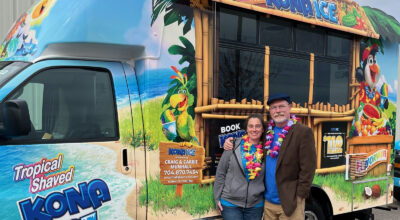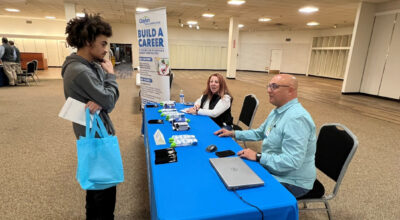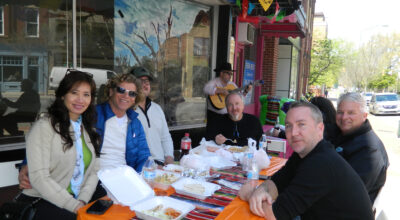Promats sales up after moving into larger facility on Harrison Road
Published 12:00 am Saturday, August 13, 2011
By Emily Ford
eford@salisburypost.com
SALISBURY — The next time you see a major league outfielder crash into the wall trying to catch a fly ball, take a close look at the padding protecting him from injury.
Chances are good it was made in Salisbury.
While Promats Athletics may have little name recognition in Rowan County, over the past two decades the company has become one of the country’s leading manufacturers and suppliers of protective wall padding and athletic mats.
In the midst of the economic downturn, July marked Promats’ best month ever. Sales Director Matt Cross declined to say exactly how good July was, but he acknowledged the company is running well ahead of its usual $500,000 monthly sales revenue.
“We are in uncharted waters with the amount of volume we are doing,” said Cross, an eight-year veteran at Promats.
Just awarded the contract for the new Florida Marlins Stadium, Promats pads the majority of minor and major league ballparks and roughly 60 percent of Division I college athletic facilities. The company recently padded stadiums for the New York Yankees, Dallas Cowboys and Duke, Auburn and Wake Forest universities.
Purchased by New York-based Sportsfield Specialties in 2007 for an undisclosed amount, Promats moved to a 60,000-square-foot plant at 1455 Harrison Road earlier this year and invested hundreds of thousands of dollars in new equipment including a large-format digital printer, computerized vinyl cutter and foam saws.
A new owner, new home and new technology “took the business to the next level,” Cross said.
Along with higher overall efficiency and doubling the capacity of some production areas, like vinyl cutting, Promats’ success hinges on customization, Cross said.
“Everyone else is cookie-cutter,” Cross said. “We build to suit your needs.”
Sales last year were up roughly 25 percent, he said.
Customers are promised a two-week turnaround, unheard of elsewhere in the industry, he said. To keep up with new orders, Promats recently bumped up its workforce by 50 percent, bringing on 13 temporary workers with plans to make at least three positions permanent.
The company purchased the Harrison Road plant from Jeff Smith for $625,000.
Every order that comes in starts from scratch, Operations Manager Marion Blackwell said.
“We don’t stock pieces and pull them out to fill an order,” Blackwell said.
Regardless of size or status, every stadium, gym and school gets the same customer service and customized attention, Blackwell said. He praised Promats employees for their attention to detail.
“They have a new recipe to follow with every new order,” he said. “They are like master chefs in their own right.”
Wayne Oliver, president of Sportsfield Specialties, had been buying padding from Promats for five years when he bought the company, Sportsfield’s first acquisition.
Sportsfield makes the sports competition equipment that Promats protects.
“It made sense,” he said.
Through Sportsfield, Promats can supply foul poles, backstop safety netting systems and other equipment while padding a stadium.
Not only did the Wake Forest Baseball Park get customized padding products from Promats Athletics, it also got new foul poles, benches, helmet and bat racks and dugout flooring from Sportsfield Specialties. Promats used a digital image to create and then stitch a home run stripe in the school’s Old Gold color into the outfield padding.
Promats’ sales fell in 2009 during the recession. In 2010, Oliver said he saw an opportunity to become more efficient with layout and processes by moving into the Harrison Road plant.
“That’s paid off big dividends,” he said.
The company also invested in new management, including Blackwell, who has a background in textiles, and new employees with expertise in lean manufacturing and engineering, Oliver said. A new layout on the plant floor made workflow more efficient.
Innovation will drive growth as Promats continues to develop products appealing to architects, especially those who build outdoor stadiums, Oliver said.
Weather and temperature changes wreak havoc with mats and pads made from foam and vinyl that expands and contracts, but not at the same rate.
That leads to wrinkles. Wrinkly pads don’t go over well in major league ballparks and NFL stadiums.
Promats has several patents in hand with more pending, including one for Delta F, a product that features four-way stretch vinyl to minimize “unsightly wrinkles or creases,” according to the website.
Another new product popular with architects is EnviroZone, derived from polyethylene foam rather than industry-standard polyurethane, Oliver said.
“It holds up much better in outdoor conditions, and it’s reusable and recyclable,” he said.
The 40 people working at the Salisbury plant often put in 50- to 60-hour weeks to keep up with orders, Cross said. If the uptick continues through September and October, the company will hire three or four temporary workers as permanent employees, he said.
Some 95 percent of Promats customers come back, making up half of the company’s orders at any one time, Cross said. The remaining orders are from new customers.
The company ships four or five trucks a day from Salisbury, which caused a problem at the former location on South Main Street. Traffic often became congested while tractor-trailers backed up to loading docks.
Besides stadiums, Promats has worked for schools. The company is making 144 wheelchair ramp pads, each one different, for the S.C. School for the Deaf and Blind.
Promats also has padded safe rooms for about 150 public schools in North Carolina, Cross said. Schools use the rooms for children with behavioral problems until authorities can respond.
The company has provided padding at a cut-rate to several local schools, including Salisbury High, Corriher-Lipe Middle and West Middle, he said.
Promats opened more than 20 years ago in Salisbury to be close to foam manufacturers who supply the North Carolina furniture industry. Promats still buys foam from three North Carolina companies, Cross said. Other raw materials, including vinyl and plywood, also are purchased domestically, he said.
Promats Athletics in Salisbury
Price tag for padding a stadium:
$60,000 for football end zones
$80,000-$200,000 for baseball park
New pads:
Every three or four years for major league ballparks
Every seven to 10 years for college athletic facilities
First job:
Original Dodgers stadium
Biggest job:
Padding four stadiums for the 2011 World Baseball Classic in Panama City. Price tag: $250,000
Contact reporter Emily Ford at 704-797-4264.




